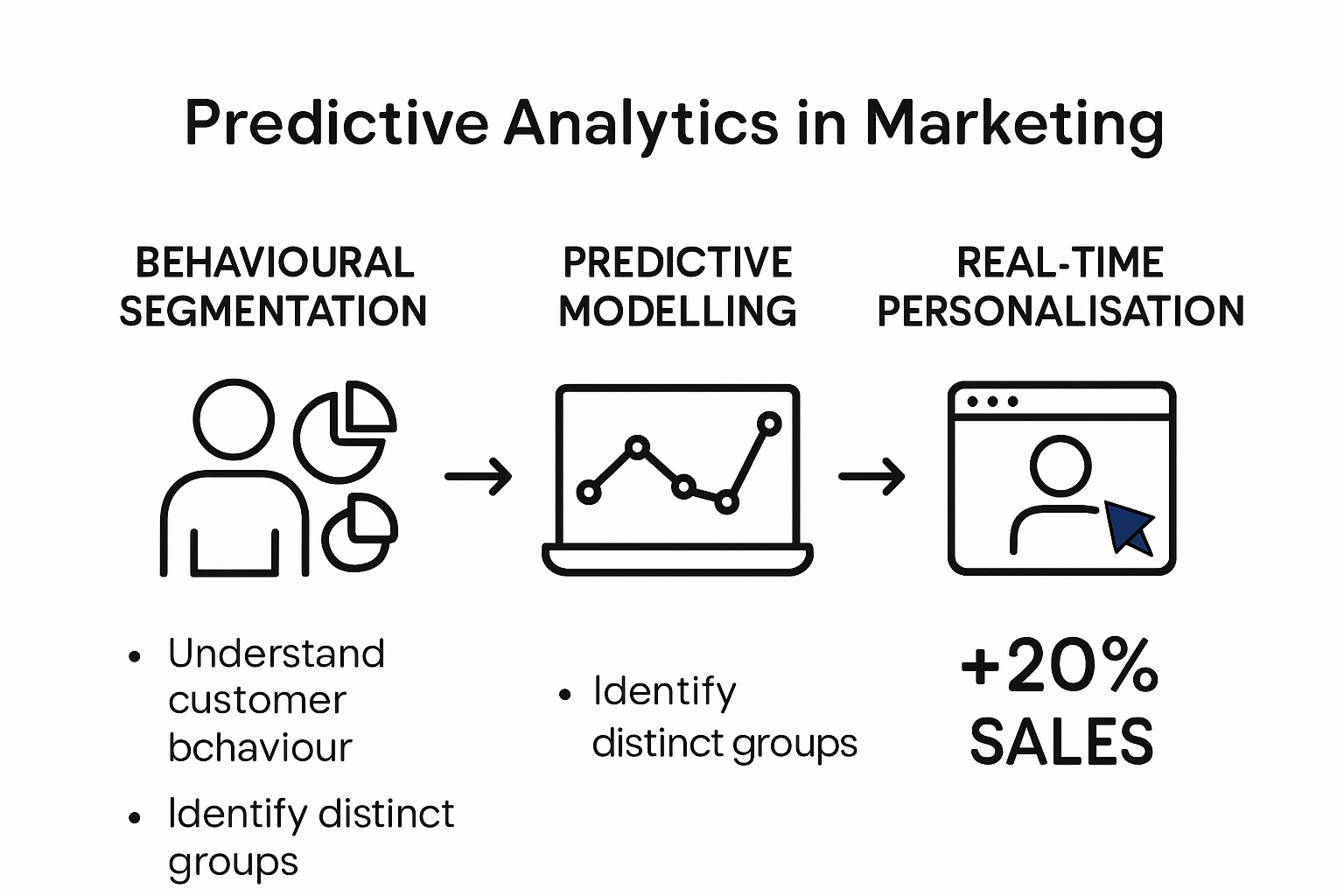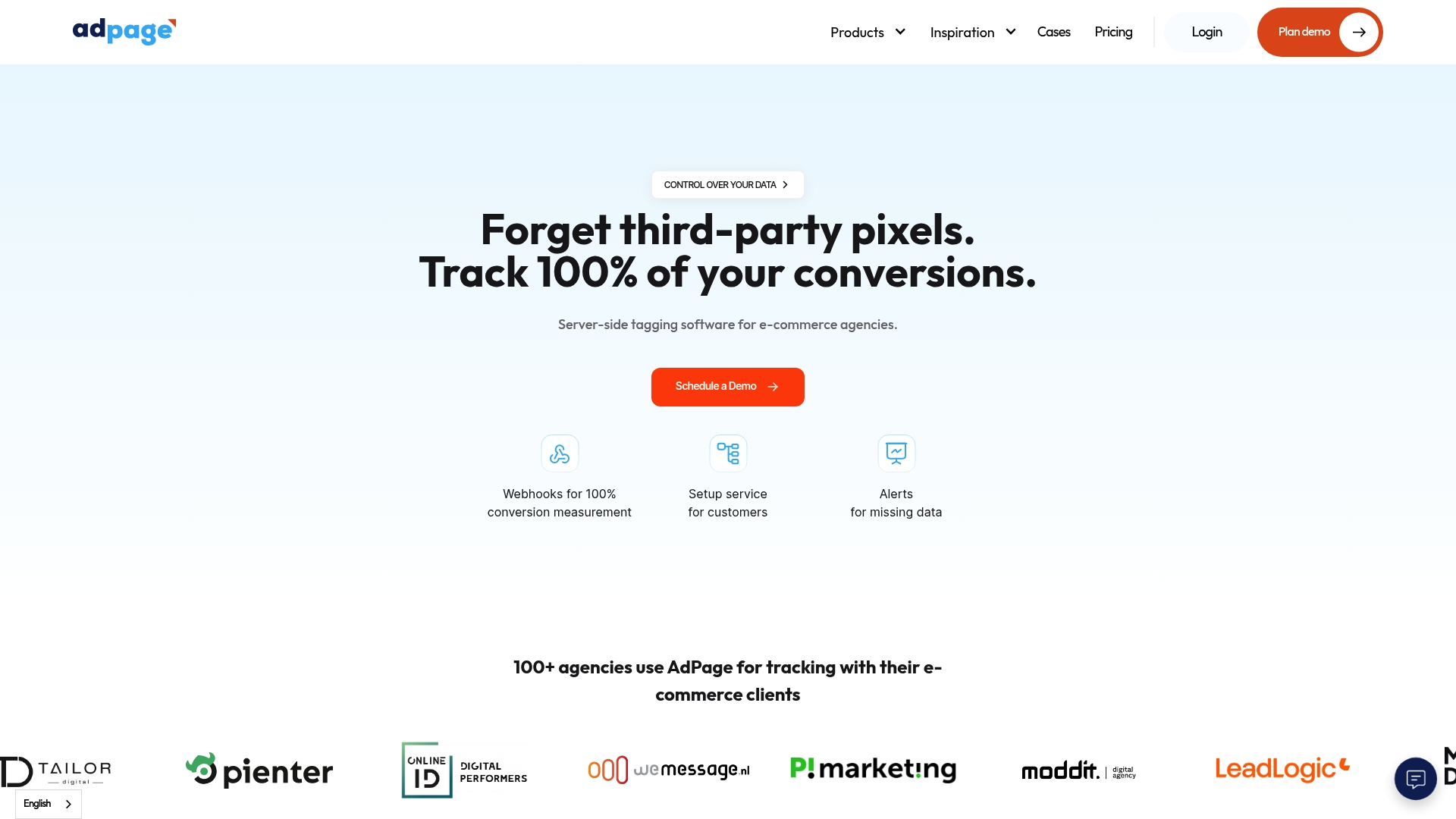Marketing feels like a high-stakes puzzle in 2025. Brands armed with cutting-edge technology are racing for attention, yet consumers are drowning in options. Yet what really sets the top performers apart is not louder advertising but smarter strategies, like those using personalisation tactics that lift conversion rates by up to 20 percent. The secret is less about chasing trends and more about turning data into genuine connections that customers actually remember.
Table of Contents
- Leveraging Data and Analytics for Smarter Campaigns
- Personalisation Tactics for Increased Conversion Rates
- Optimising Multi-Channel Reach and Engagement
- Innovative Tools and Automation for E-Commerce Success
Quick Summary
| Takeaway | Explanation |
|---|---|
| Utilise advanced data analytics | Leverage consumer behaviour insights for targeted campaigns and personalized communication strategies. |
| Implement predictive analytics techniques | Anticipate customer needs using historical data and real-time personalization to enhance marketing effectiveness. |
| Emphasise ethical data usage | Foster trust by ensuring transparency in data collection and prioritizing customer privacy in marketing practices. |
| Focus on dynamic content personalisation | Tailor experiences and recommendations to individual preferences, significantly boosting conversion rates. |
| Integrate multi-channel marketing strategies | Create cohesive, integrated experiences across platforms to maximize engagement and brand awareness. |
Leveraging Data and Analytics for Smarter Campaigns
Marketing strategies in 2025 demand precision and intelligence. Data and analytics transform how businesses connect with customers, moving beyond traditional guesswork to create targeted, personalized experiences.
Understanding Advanced Consumer Insights
The power of data analytics goes far beyond simple demographic tracking. Modern marketing requires deep understanding of consumer behaviour patterns and predictive modelling. Discover advanced analytics techniques that unlock genuine customer understanding.
According to Harvard’s Division of Continuing Education, marketing analytics enable businesses to optimize customer relationships by providing granular insights into purchasing behaviours, preferences, and engagement patterns. This approach allows marketers to craft highly personalised communication strategies.
The 2023 study published in the Journal of World Economy demonstrates how leading companies like Netflix and Amazon leverage data analytics to create exceptional customer experiences. These organisations do not simply collect data they transform it into actionable intelligence that drives strategic decision making.
Predictive Analytics and Campaign Optimization

Predictive analytics represents the next frontier in marketing strategy. By utilising machine learning algorithms, businesses can anticipate customer needs before they emerge. The 2022 research paper exploring causal machine learning algorithms revealed that targeted coupon campaigns can generate statistically significant sales improvements when precisely tailored to specific customer segments.
Key strategies for implementing predictive analytics include:
- Behavioural Segmentation: Categorising customers based on nuanced interaction patterns
- Predictive Modelling: Using historical data to forecast future customer actions
- Real Time Personalisation: Dynamically adjusting marketing messages based on immediate customer signals
Successful implementation requires robust data collection systems, advanced analytical tools, and a commitment to continuous learning and adaptation. Marketers must view data not as a static resource but as a living, breathing ecosystem of customer intelligence.
Ethical Considerations in Data Utilisation
While data analytics offers tremendous potential, ethical considerations remain paramount. Businesses must balance sophisticated targeting with respect for individual privacy. This means implementing transparent data collection practices, securing explicit customer consent, and maintaining rigorous data protection standards.
The emerging marketing landscape demands a holistic approach that combines technological capability with genuine customer empathy. By treating data as a tool for understanding rather than manipulation, organisations can build trust and create more meaningful customer relationships.
In 2025, the most successful marketing strategies will be those that transform raw data into genuine human connection.
Personalisation Tactics for Increased Conversion Rates
Converting potential customers into loyal buyers requires more than generic marketing approaches. Personalisation has transformed from a novelty to a critical strategy for businesses seeking to enhance their conversion rates and create meaningful customer connections.
Dynamic Content and User Experience
Modern consumers expect tailored experiences that speak directly to their individual needs and preferences. Learn advanced personalisation techniques that can dramatically improve engagement.
According to research from ResearchGate, personalization strategies can result in conversion rate increases of 10–20%. This significant potential highlights the importance of implementing sophisticated, data-driven personalization tactics.
Key elements of effective dynamic content include:
- Contextual Recommendations: Suggesting products based on browsing history and past purchasing behaviour
- Adaptive User Interfaces: Changing website layouts and content presentation according to individual user preferences
- Personalised Messaging: Crafting communication that resonates with specific customer segments
Segmentation and Targeted Approaches
Successful personalization goes beyond surface-level modifications. It requires deep understanding of customer segments, their motivations, and their unique journey through the purchasing funnel.
Advanced segmentation strategies involve:
- Analyzing behavioural data
- Creating detailed customer personas
- Developing nuanced communication strategies for different audience groups
By leveraging machine learning algorithms and advanced analytics, businesses can create increasingly precise targeting mechanisms that anticipate customer needs before they are explicitly expressed.
Privacy-Conscious Personalization
While personalization offers tremendous opportunities, it must be balanced with robust privacy considerations. Customers value tailored experiences but are increasingly concerned about data protection and consent.
Effective personalization in 2025 requires:
- Transparent data collection practices
- Clear opt-in mechanisms
- Giving customers control over their data
Businesses that prioritize ethical data usage and demonstrate genuine respect for customer privacy will build stronger, more trusting relationships. The goal is not intrusive tracking but creating genuinely helpful, relevant experiences that add value to the customer journey.
As technology continues to evolve, personalization will become increasingly sophisticated. The most successful marketing strategies will be those that seamlessly blend advanced technological capabilities with human-centric design and empathetic understanding.
Optimising Multi-Channel Reach and Engagement
Successful marketing in 2025 demands a sophisticated approach to multi-channel strategies that seamlessly connect with customers across diverse platforms and touchpoints. The ability to create cohesive, integrated experiences has become a critical differentiator for businesses seeking to maximize their marketing effectiveness.
Strategic Channel Integration
Multi-channel marketing is no longer about simply being present on multiple platforms. It requires a nuanced, data-driven approach that synchronizes messaging, user experience, and engagement strategies. Discover advanced campaign optimization techniques that can transform your marketing approach.
Research on multi-platform social media strategies reveals compelling insights. According to a comprehensive study, companies with diversified social media strategies can increase total web sales by 2 to 5 percent. This performance boost stems from the complementary effect of overlapping impressions, where consistent messaging across platforms reinforces brand awareness and purchase intent.
Key considerations for effective channel integration include:
- Consistent Brand Messaging: Maintaining a unified brand voice across all platforms
- Cross-Platform Data Synchronization: Ensuring seamless information flow between different marketing channels
- Adaptive Content Strategies: Tailoring content to the specific characteristics of each platform
To help compare the roles of different multi-channel strategies, the table below summarises key components and their benefits as discussed above.
| Multi-Channel Strategy Component | Description | Benefit |
|---|---|---|
| Consistent Brand Messaging | Unified brand voice across all platforms | Increases brand awareness |
| Cross-Platform Data Synchronization | Sharing/aligning data among channels | Seamless user experience |
| Adaptive Content Strategies | Customising content for each platform | Higher engagement rates |
| Diversified Social Media Presence | Active marketing on multiple social platforms | 2–5% increase in web sales |
Budget Allocation and Optimization
Precise budget allocation across multiple channels represents a critical challenge for modern marketers. Innovative research introduces advanced optimization strategies that go beyond traditional approaches. A groundbreaking study on adaptive budget optimization demonstrates how combinatorial bandit strategies can dynamically adjust marketing spend based on real-time performance data.
The research highlights the importance of:
- Continuous performance monitoring
- Agile budget reallocation
- Data-driven decision making
Businesses can leverage machine learning algorithms to create more intelligent, responsive marketing budgets that maximize return on investment across different channels.
Personalised Cross-Channel Experiences
The future of multi-channel marketing lies in creating truly personalized, interconnected experiences. A sophisticated research paper on agentic personalisation explores how advanced decision-making frameworks can optimize communication across multiple touchpoints.
The study’s approach demonstrates remarkable potential, showing significant increases in engagement metrics when applying advanced personalization techniques across large user bases. This goes beyond simple retargeting, focusing instead on creating a holistic, adaptive marketing ecosystem that responds to individual user behaviors and preferences.
Successful multi-channel strategies in 2025 will require:
- Advanced data integration
- Real-time personalization capabilities
- Sophisticated analytics and decision-making tools
Marketers must view multi-channel engagement as an interconnected ecosystem rather than a series of isolated interactions. The most effective approaches will blend technological sophistication with genuine understanding of customer journeys, creating seamless, intuitive experiences that feel natural and valuable to users.
As digital platforms continue to evolve, the ability to create intelligent, adaptive multi-channel strategies will separate market leaders from followers. The future belongs to those who can transform data into meaningful, personalized customer connections.
Innovative Tools and Automation for E-Commerce Success
E-commerce success in 2025 hinges on strategic technological integration and intelligent automation. As digital marketplaces become increasingly competitive, businesses must leverage cutting-edge tools that streamline operations, enhance customer experiences, and drive measurable growth.
Advanced Content and Recommendation Systems
Content optimization represents a critical frontier for e-commerce innovation. Explore advanced automation strategies that can transform your digital marketing approach.
Research demonstrates the remarkable potential of intelligent recommendation algorithms. A groundbreaking study on multi-armed bandit algorithms revealed significant performance improvements, including a 6.13% relative increase in click-through rates and a 16.1% relative increase in conversion rates compared to traditional approaches.
Key capabilities of sophisticated recommendation systems include:
- Dynamic Content Personalization: Adapting product suggestions in real-time
- Predictive User Behavior Modeling: Anticipating customer preferences
- Contextual Engagement Optimization: Tailoring recommendations based on multiple data points
Below is a table summarising key statistics and capabilities from advanced content and recommendation systems discussed above.
| Capability/Outcome | Description | Reported Performance |
|---|---|---|
| Dynamic Content Personalisation | Real-time product suggestions | 16.1% higher conversion rate |
| Predictive User Behaviour Modelling | Anticipates customer preferences | Enhanced targeting accuracy |
| Contextual Engagement Optimization | Tailored recommendation based on data points | 6.13% higher click-through rate |
| Multi-armed Bandit Algorithm | Adaptive automated recommendation system | Significant overall performance gain |
Automated Creative and Advertising Optimization
Marketing creativity is being revolutionized by intelligent automation technologies. An innovative research paper on automated creative optimization demonstrates how machine learning can enhance advertising performance, achieving a 7% increase in click-through rates through automated creative generation and selection.
Advanced automation tools now enable businesses to:
- Generate multiple ad variations automatically
- Conduct rapid A/B testing
- Continuously refine marketing materials based on performance data
This approach transforms marketing from a manual, intuition-driven process to a data-powered, scientifically optimized strategy.
Operational Efficiency and Marketing Automation
According to BigCommerce’s comprehensive analysis, marketing automation represents a transformative approach for e-commerce businesses. By streamlining complex processes, these tools enable more sophisticated, personalized customer engagement strategies.
Effective marketing automation encompasses:
- Intelligent Email Campaigns: Triggered communications based on specific customer behaviors
- Customer Segmentation: Dynamic grouping using advanced analytical criteria
- Performance Tracking: Real-time monitoring of marketing initiatives
The most successful e-commerce businesses will view automation not as a replacement for human creativity, but as a powerful amplification tool. By combining technological sophistication with strategic human insight, companies can create more responsive, adaptive marketing ecosystems.
As we move further into 2025, the boundary between human marketing expertise and artificial intelligence will continue to blur. Businesses that embrace this evolution proactively will gain significant competitive advantages, transforming raw data and technological capabilities into meaningful customer experiences that drive sustainable growth.

Frequently Asked Questions
What are the key strategies for enhancing marketing in 2025?
The main strategies include leveraging advanced data analytics for consumer insights, implementing effective personalisation tactics, optimising multi-channel marketing, and using innovative tools for e-commerce success.
How can personalisation improve conversion rates?
Personalisation can significantly enhance conversion rates by tailoring content and experiences to individual customer preferences, resulting in up to a 20% increase in conversion rates.
Why is ethical data usage important in marketing?
Ethical data usage fosters trust with customers by ensuring transparency in data collection and prioritising customer privacy, which is crucial in today’s marketing landscape.
How can businesses optimise their multi-channel marketing strategies?
Businesses can optimise multi-channel strategies by ensuring consistent messaging across platforms, synchronising data between channels, and tailoring content for the specific characteristics of each platform.
Unlock True Data-Driven Marketing for 2025
Are you worried your marketing decisions in 2025 are being held back by incomplete or unreliable data? This article revealed how ethical data usage, advanced analytics, and personalisation tactics are crucial for success. Yet too many e-commerce marketers still struggle with tracking gaps and data loss, leading to missed opportunities and lower conversion rates. If your current analytics tools are letting valuable insights slip through the cracks, it is time to act.

Seize the advantage of accurate conversion tracking and 100 percent data monitoring so you can power your next campaign with confidence. Discover how AdPage can help you optimise your tracking and boost conversion rates. Our platform brings you server-side tagging, GDPR-ready consent management, and seamless integration with Shopify, WooCommerce, Magento, and more. Ready to transform your marketing strategy and never miss a conversion again? Visit AdPage today and request your onboarding session while industry competitors are still relying on outdated methods.



.png)
